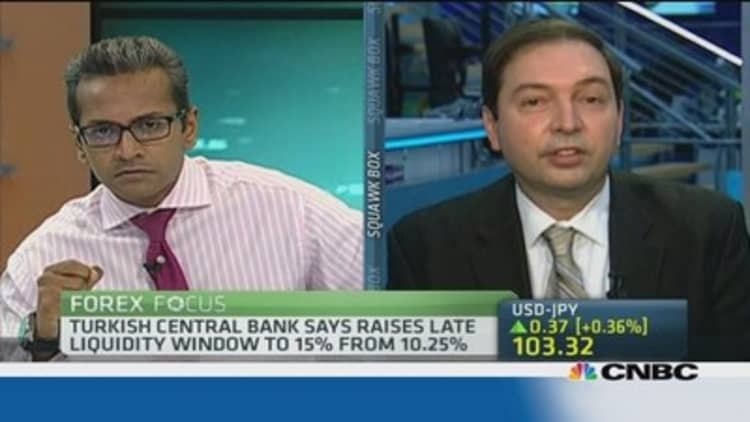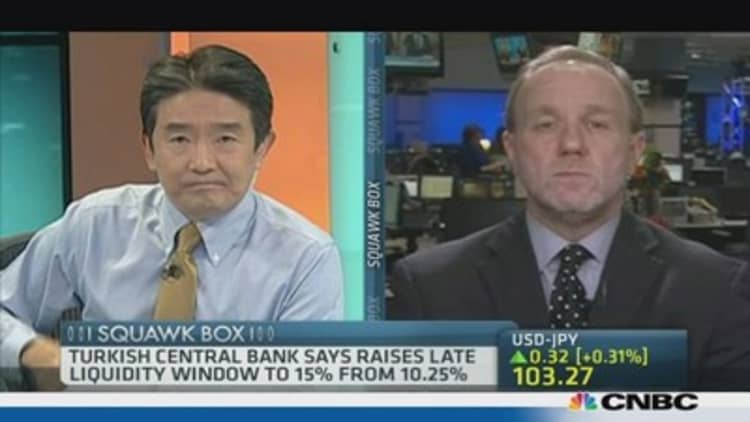
Renewed fears of a crisis in emerging markets have come to a head in recent weeks, interrupting chatter about a pick-up in global growth, but which parts of the world are most exposed to further trouble in the region?
Last week, sharp declines in the value of the Argentine peso triggered a fallout across emerging market currencies, while worries over China's growth and credit issues and ongoing concerns over further tapering by the Federal Reserve exacerbated the selloff.
The selloff prompted Turkey's central bank to hike interest rates in response on Tuesday, in what some have described as a panic move to try and restore anxious investors.
(Read more: Turkey's drastic action may not save emerging markets)
According to analysts at investment bank Barclays, if the volatility escalates, the euro area will be the most exposed, with Japan close behind followed by the U.S.
Barclays divided emerging markets into two groups, the 'stressed group': Argentina, Brazil, India, most of ASEAN, Russia, South Africa, Turkey and Venezuela, which have seen a weighted 16 percent fall in their currencies over the past 12 months, and a more resilient group, made up of the remaining emerging markets whose FX rates have been relatively stable.
Looking at the ratio of exports to gross domestic product (GDP), Europe had a 3.1 percent exposure to these stressed economies in 2013, Barclays said, while Japan had 2.4 percent and U.S. 1.3 percent.
(Read more: Will the Fed throw emerging markets a bone?)
While the euro area was the most vulnerable, the Barclays analysts pointed out that as long as the current emerging market weakness was contained to these stressed economies, the G3's GDP rates should not be majorly impacted, as the regions are more exposed to the stronger emerging economies.
Throwing a spanner in the works, however, is heightened concern about China, Barclays said, pointing out that if China were to seriously reduce its imports from the G3 economies it would have more significant implications.
(Read more: Emerging-market currency 'contagion' spreads)
Other analysts also told CNBC that China remained the largest threat to the potential for an escalated emerging markets crisis.
"The question is how will this effect global financial markets? Will all of these mini crises in emerging markets have a big spillover effect on the developed world?" said Boris Schlossberg, managing director of BK Asset Management. "And to me, the answer doesn't lie with Turkey or Argentina, which are small, isolated economies. It's a question of whether China becomes a big problem."

Analysts at U.K.-headquartered research house Capital Economics said they doubt the emerging market selloff would have much impact on the global economy, however.
In a note published on Tuesday, the analysts gave three reasons why they did not see the recent selloff escalating into a crisis: developed markets are now in a stronger position than they used to be; the emerging markets with the most influence on the developed world have not been too affected; on a historic basis, major downturns in the emerging world have not had a big effect elsewhere.
"Even if the emerging market instability worsens it may have a silver lining for advanced economies by adding to the downward pressure on global commodity prices and thereby helping to keep inflation (and thus interest rates) low," said Andrew Kenningham, senior global economist at the firm.
(Read more: Who pulled the trigger on emerging markets?)
Meanwhile, a note from Credit Suisse published Tuesday said some economies in Asia, particularly those hit hard amid last year's tapering panic, such as India and Indonesia, were now more well positioned to withstand another intense bout of volatility.
"This is not to suggest that either country would be unaffected by a risk-off episode...but the extent of the damage for a given shock is likely to be less," said Robert Prior Wandesforde, head of Southeast Asia and India economics at Credit Suisse.
Turkey's shock 425 basis-point rate hike Tuesday helped calm volatility in global equity markets and currencies on Tuesday. The Turkish lira rebounded to 2.2 to the dollar from 2.253, while spiked 150 points in early trade on Wednesday.
— By CNBC's Katie Holliday: Follow her on Twitter @hollidaykatie


